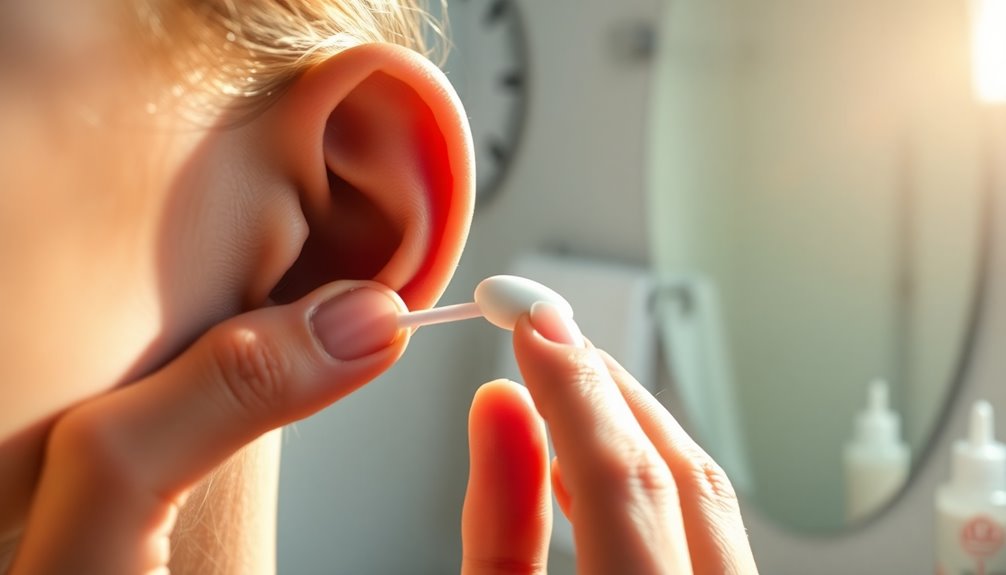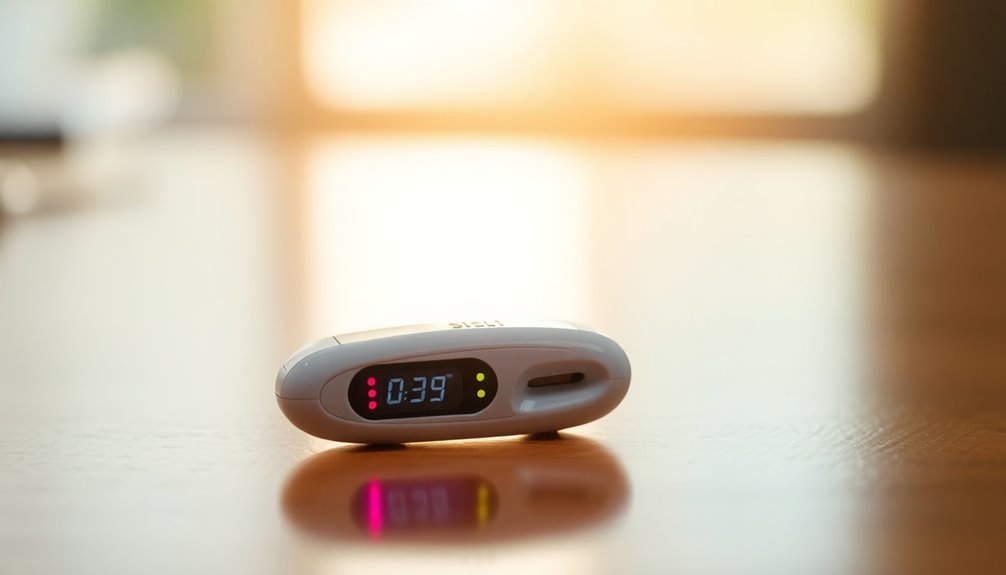If you experience sudden hearing loss or notice symptoms like ear fullness, ringing, or dizziness, get emergency medical care immediately. Quick action and early treatment with corticosteroids and possibly hyperbaric oxygen therapy can greatly improve your chances of recovery and prevent permanent damage. Don’t wait—prompt intervention makes all the difference. To understand the signs, causes, and how to protect your hearing, explore the details ahead.
Key Takeaways
- Seek emergency medical care immediately at the first sign of sudden hearing loss.
- Early diagnosis with audiometry and imaging improves chances of recovery.
- Initiate corticosteroid treatment as soon as possible to reduce inner ear inflammation.
- Delay in treatment increases risk of permanent hearing damage.
- Prompt action and rapid intervention are essential for the best possible outcome.
Understanding Sudden Sensorineural Hearing Loss

Sudden sensorineural hearing loss (SSNHL) is a rapid loss of hearing that occurs over less than three days, often without an obvious cause. When this happens, your inner ear or auditory nerve suddenly stops transmitting sound signals properly. Unlike temporary hearing issues, SSNHL can be permanent if not treated promptly. It might affect one or both ears, and you may notice a muffled or distorted sound. The exact cause isn’t always clear, but it can result from viral infections, blood flow problems, or trauma. Because of its sudden nature, understanding SSNHL is vital. Recognizing how quickly it develops underscores the importance of seeking urgent medical attention to improve your chances of recovery. Early intervention can make a significant difference in restoring your hearing. Environmental considerations and other factors can influence recovery outcomes, making awareness even more crucial.
Recognizing the Signs and Symptoms
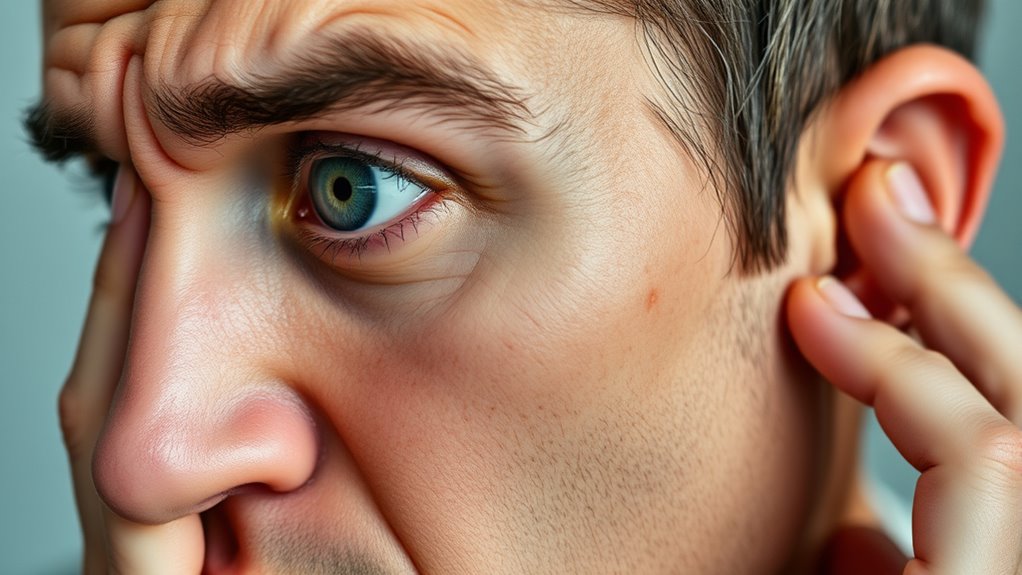
Recognizing the signs and symptoms of SSNHL can help you seek immediate treatment and improve your chances of recovery. Typically, you’ll notice a sudden decrease in hearing ability in one ear, often occurring without warning. You might experience a feeling of fullness or pressure in the affected ear. Tinnitus, or a ringing, buzzing, or hissing sound, is common. Some people also report dizziness or balance issues. The hearing loss usually develops quickly, over a few hours or overnight. If you notice any sudden change in your hearing, don’t ignore it. Promptly recognizing these symptoms can lead to faster diagnosis and treatment, which is essential for the best possible outcome. Trust your instincts—seek medical attention immediately if these signs appear. Additionally, understanding the importance of early intervention can significantly influence recovery prospects.
The Importance of Immediate Action

If you experience sudden hearing loss, you need to get emergency care right away. Acting quickly can make the difference between recovery and permanent damage. Don’t wait—timing is vital to protect your hearing. Early intervention is crucial in cases of sensorineural hearing loss to improve the chances of full recovery.
Seek Emergency Care Promptly
Prompt medical attention is essential when you experience sudden sensorineural hearing loss because timely treatment can markedly improve your chances of recovery. Don’t wait or try to self-diagnose—seek emergency care immediately. The faster you get evaluated by a healthcare professional, the sooner they can determine the cause and start appropriate treatment. Emergency rooms or urgent care centers are equipped to handle this urgent situation and can initiate diagnostic tests quickly. Delaying care reduces the likelihood of restoring hearing and increases the risk of permanent damage. Remember, acting fast is critical. By prioritizing immediate medical attention, you give yourself the best chance to preserve your hearing and avoid long-term complications. Mammography guidelines emphasize the importance of prompt detection and action. Don’t hesitate—seek emergency care as soon as possible.
Time Is Critical Factor
When sudden sensorineural hearing loss occurs, acting quickly can make all the difference in your recovery. The sooner you seek medical attention, the better your chances of restoring hearing. Delays can lead to permanent damage because the inner ear and nerve pathways need prompt treatment to reduce inflammation or restore blood flow. Every hour counts, so don’t wait to see if the hearing will improve on its own. Early intervention with corticosteroids or other therapies can notably improve outcomes. Time is your most critical factor—delaying treatment risks permanent hearing loss. If you notice sudden hearing changes, get to a healthcare professional immediately. Acting fast maximizes the chance of saving your hearing and prevents long-term damage. Understanding ear health and recognizing early symptoms can also facilitate faster responses and better prognosis.
Avoid Delays in Treatment
Delaying treatment for sudden sensorineural hearing loss can substantially reduce your chances of recovery. The faster you seek medical help, the better your odds of restoring hearing. Don’t wait or delay, even if your hearing loss seems mild at first. Immediate intervention with corticosteroids or other treatments can prevent permanent damage to your inner ear. Every hour counts—delays can lead to irreversible loss. Contact a healthcare professional right away if you experience sudden hearing changes. The sooner you act, the more likely you are to preserve your hearing and avoid long-term consequences. Remember, prompt treatment is your best defense against permanent impairment. Don’t hesitate; act quickly to give yourself the best chance for recovery. Recognizing the signs of hearing loss early can also help ensure timely intervention.
Causes and Risk Factors

Sudden sensorineural hearing loss (SSNHL) often occurs without warning, but several factors can increase your risk. Age plays a role; it’s more common in adults over 50. Viral infections, like herpes or influenza, can damage your inner ear or auditory nerve. Circulatory problems, such as blood clots or hypertension, may reduce blood flow to the ear, causing sudden loss. Head trauma or injuries can also disrupt your auditory system unexpectedly. Certain autoimmune conditions, like multiple sclerosis or autoimmune inner ear disease, target your inner ear tissues. Additionally, exposure to loud noises over time can weaken your hearing. Understanding these risk factors helps you recognize potential warning signs and seek prompt treatment, which is vital for the best possible recovery. Monitoring digital literacy programs can also be beneficial, especially for seniors, to recognize early symptoms and prevent delays in treatment.
Diagnostic Procedures and Tests
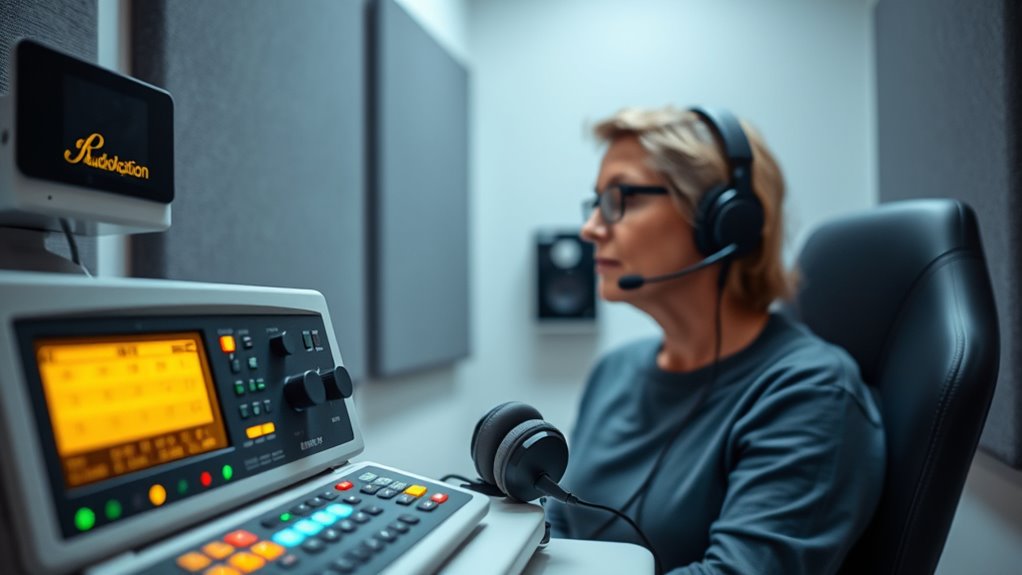
To diagnose sudden sensorineural hearing loss accurately, healthcare providers use a combination of specialized tests and procedures. The first step is usually a thorough hearing test called audiometry, where you’ll listen to sounds at different pitches and volumes to determine the extent of your hearing loss. Tympanometry may also be performed to evaluate middle ear function, ruling out other causes like infections or fluid buildup. Additionally, doctors might order imaging studies such as MRI or CT scans to identify any structural issues or tumors. These tests help confirm the diagnosis, rule out other conditions, and guide your treatment plan. Precise diagnosis is essential because timely intervention can considerably improve your chances of recovery. Recognizing the importance of specialized testing can help ensure that the underlying cause is accurately identified, leading to more effective treatment options.
Treatment Options and Effectiveness
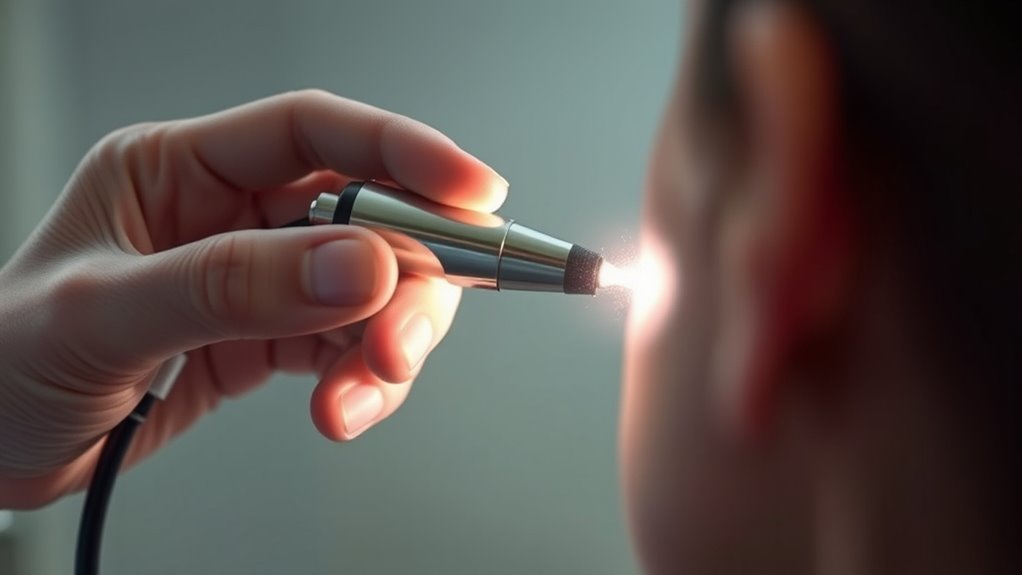
You can improve your chances of recovery with corticosteroid therapy, which has shown notable success in many cases. Hyperbaric oxygen therapy may offer additional benefits, especially if started early. Emerging treatments are also being explored to enhance outcomes and provide new hope for patients. Incorporating exfoliation techniques may further support auditory health and tissue recovery.
Corticosteroid Therapy Success
Corticosteroid therapy has become the standard treatment for sudden sensorineural hearing loss, with many patients experiencing significant improvement when administered promptly. When you start treatment within the first two weeks, your chances of hearing recovery increase substantially. Corticosteroids reduce inflammation and swelling in the inner ear, helping to preserve hair cells and nerve function. Oral steroids are commonly prescribed, but sometimes injections directly into the middle ear are used for faster absorption. Most patients see partial or full recovery, especially with early intervention. However, success varies depending on factors like age, severity, and how quickly you seek treatment. Overall, corticosteroid therapy offers a proven, effective approach to improving your chances of regaining hearing after sudden loss. Additionally, ongoing research emphasizes the importance of cybersecurity vulnerabilities during treatment and recovery processes to protect patient data from potential threats.
Hyperbaric Oxygen Benefits
Could hyperbaric oxygen therapy be an effective treatment option for sudden sensorineural hearing loss? It’s believed to improve blood flow and oxygen delivery to the inner ear, promoting recovery. Studies show that timely hyperbaric treatment can increase the chances of hearing improvement, especially when combined with steroids. This therapy involves breathing pure oxygen in a pressurized chamber, enhancing oxygen levels beyond normal limits. Benefits include:
- Increased oxygen supply to damaged cochlear tissues
- Reduced inner ear inflammation
- Enhanced healing processes
- Improved nerve function
- Potentially faster recovery times
While not suitable for everyone, patients receiving hyperbaric oxygen therapy early often experience better outcomes. Consulting your doctor can help determine if this treatment complements your recovery plan and accelerates your hearing restoration.
Emerging Treatment Options
Building on the potential benefits of hyperbaric oxygen therapy, researchers are exploring other emerging treatment options that may enhance recovery from sudden sensorineural hearing loss. One promising approach is corticosteroid injections directly into the middle ear, which can deliver higher drug concentrations to the inner ear. Additionally, some studies suggest that neuroprotective agents and antioxidants might support nerve regeneration and reduce oxidative stress. Emerging research also investigates the use of platelet-rich plasma (PRP) therapy to promote healing. While these options show potential, their effectiveness varies, and more clinical trials are necessary to establish safety and success rates. Staying informed about these innovations can help you discuss all available options with your healthcare provider for the best chance at recovery.
Long-term Implications of Delayed Care

When treatment for sudden sensorineural hearing loss is delayed, the risk of lasting damage increases considerably. You may experience permanent hearing loss, which can affect your communication and quality of life. Additionally, delaying care can lead to:
- Increased likelihood of tinnitus becoming chronic
- Greater difficulty in understanding speech
- Emotional impacts like anxiety or depression
- Higher chances of needing more invasive treatments later
- Reduced chances of full hearing recovery
The longer you wait, the more your chances of regaining normal hearing diminish. Early intervention is critical to minimizing these long-term effects. Acting promptly can preserve your hearing ability and reduce the emotional and social toll of untreated loss.
Preventive Measures and When to Seek Help
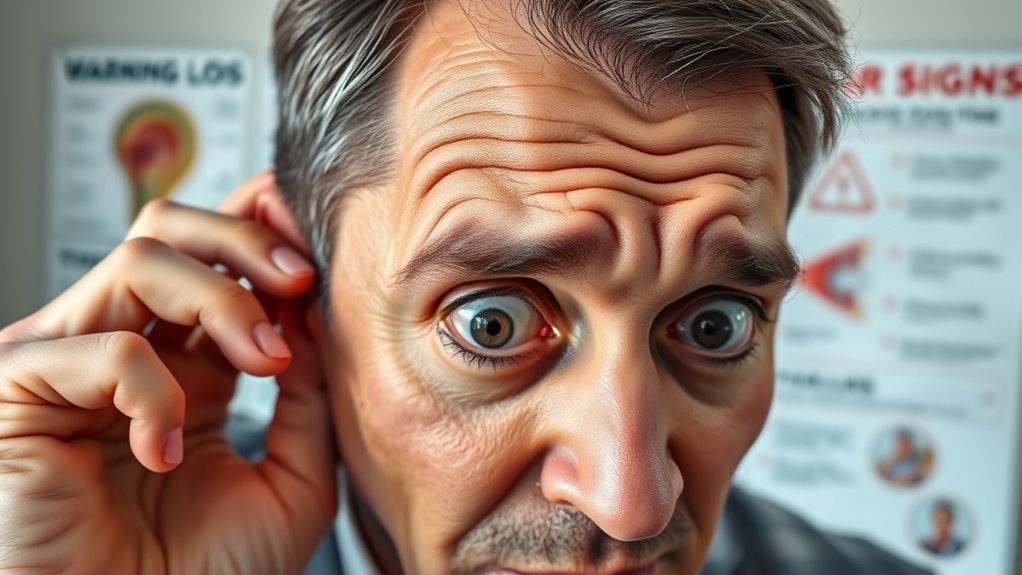
Taking steps to protect your hearing and recognizing early warning signs can considerably reduce the risk of sudden sensorineural hearing loss. Wear ear protection in noisy environments, avoid inserting objects into your ears, and limit exposure to loud sounds. Regular check-ups with an audiologist can catch issues early. Be alert for symptoms like sudden ringing, muffled hearing, or a feeling of fullness in your ear. If you notice any sudden changes, don’t wait—seek medical help immediately. Prompt action can make a difference in preserving your hearing. Remember, early intervention improves your chances of recovery, so act quickly when you experience symptoms or suspect hearing problems. Prioritize your hearing health to prevent complications and maintain your quality of life.
Supporting Recovery and Rehabilitation
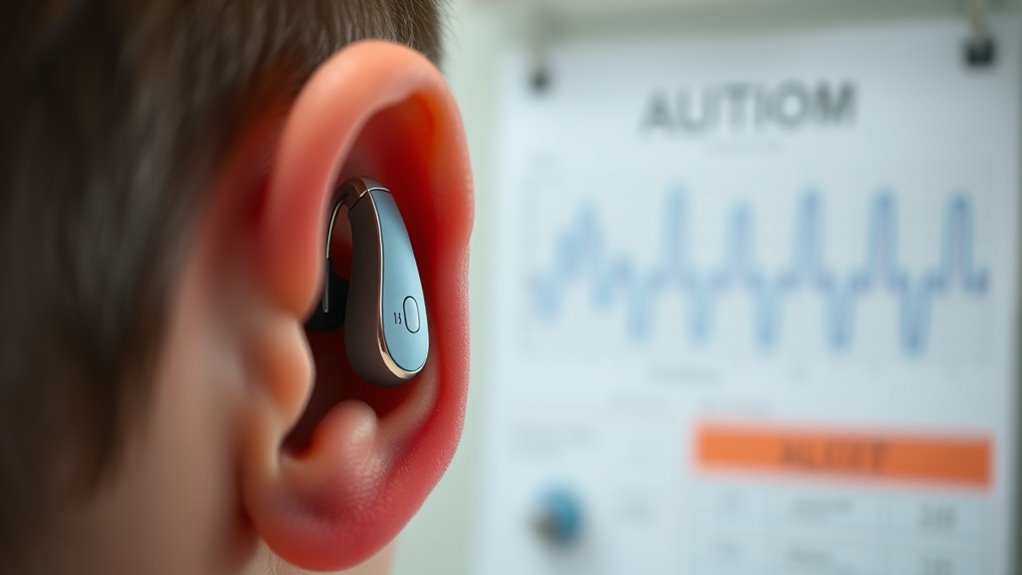
Have you considered how targeted support and rehabilitation can enhance your recovery after sudden sensorineural hearing loss? Engaging in tailored therapy and following your healthcare provider’s guidance can substantially improve your hearing and communication skills. Recovery may involve hearing aids, cochlear implants, or auditory training exercises to maximize your residual hearing. Emotional support and counseling can help you cope with frustration or anxiety during recovery. Additionally, lifestyle adjustments—like avoiding loud environments and protecting your ears—are essential.
Targeted support and lifestyle changes can significantly improve your recovery after sudden sensorineural hearing loss.
You can focus on:
- Attending audiologist-led hearing therapy sessions
- Using assistive listening devices
- Practicing auditory training exercises
- Seeking emotional and psychological support
- Making lifestyle changes to protect your hearing
Frequently Asked Questions
Can Sudden Hearing Loss Occur Without Any Pain or Discomfort?
Yes, sudden hearing loss can happen without pain or discomfort. You might notice a rapid decrease in hearing ability in one ear, but feel no pain, dizziness, or other symptoms. This type of loss is often sudden and unexpected, making it easy to overlook at first. If you experience any sudden change in hearing, even without pain, you should see a healthcare professional immediately to evaluate and treat the cause.
Are There Age Groups More Prone to Sudden Sensorineural Hearing Loss?
You might wonder if certain age groups are more prone to sudden sensorineural hearing loss. Typically, middle-aged and older adults are at higher risk, especially those over 50. However, it can affect younger people as well, though less commonly. Age, exposure to loud noise, and certain health conditions increase your risk. If you notice sudden hearing changes, regardless of age, seek medical help immediately to protect your hearing.
What Are the Potential Side Effects of Common Treatments?
When considering treatment options for sudden sensorineural hearing loss, you should be aware of potential side effects. Corticosteroids, often prescribed, can cause mood swings, increased blood sugar, or upset stomach. If you receive antiviral medications, watch for allergic reactions or dizziness. Always communicate any unusual symptoms to your doctor promptly, and follow instructions carefully to minimize risks and improve your chances of recovery.
How Long Does Recovery Typically Take With Prompt Intervention?
Recovery time varies depending on the severity and treatment response. If you seek prompt intervention, you might notice improvement within a few days to weeks. Some individuals recover fully in a month, while others may need longer, especially if treatment starts late. It’s essential to follow your healthcare provider’s advice and attend all follow-up appointments to maximize your chances of recovery and prevent lasting hearing loss.
Is There a Way to Prevent Sudden Hearing Loss?
Imagine you’re at a concert when you suddenly notice muffled hearing. While some causes are unpredictable, you can diminish risk by avoiding loud environments and protecting your ears with earplugs. Regular check-ups and maintaining overall ear health also help. Though not all sudden hearing loss is preventable, these steps lower your chances and ensure you’re ready to act quickly if symptoms appear.
Conclusion
Don’t delay if you detect deafness; decisive, swift action can save your hearing. Recognize the risks, respond rapidly, and seek specialized support to stop sudden sensorineural hearing loss in its tracks. Early engagement guarantees effective treatment, enhances recovery, and reduces long-term loss. Remember, promptness prevents permanence—so act immediately, avoid anguish, and advocate for your auditory health before silence takes hold. Your swift step can save your sound.




